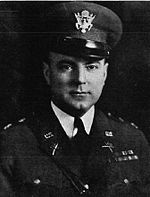Bernard W. Kearney, Date of Birth, Place of Birth, Date of Death
TweetBernard W. Kearney
American politician
 Date of Birth: 23-May-1889
Date of Birth: 23-May-1889
 Place of Birth: Ithaca, New York, United States
Place of Birth: Ithaca, New York, United States
Date of Death: 03-Jun-1976
Profession: judge, lawyer, politician
Nationality: United States
Zodiac Sign: Gemini 
About Bernard W. Kearney
- Bernard William "Pat" Kearney (May 23, 1889 – June 3, 1976) was a Republican member of the United States House of Representatives from New York.
- Kearney served on the U.S.
- House of Representative's Un-American Activities Committee (HUAC) during the Cold War. A native of Ithaca, New York and a graduate of Albany Law School, in 1914, Kearney began a practice in Gloversville.
- He enlisted in the New York National Guard in 1909, and took part in the 1916 border patrol mission that was part of the Pancho Villa Expedition.
- During World War I he completed officer training, received a commission, and served in France as a member of the 27th Division.
- Kearney was prominent in veterans affairs, and served as National Commander of the Veterans of Foreign Wars from 1936 to 1937.
- He remained in the National Guard after the war, attained the rank of brigadier general, and retired in 1940.
- During World War II, Kearney served in the New York Guard, and commanded a brigade.
- During the National Guard's post-World War II reorganization, he was recalled to service, promoted to major general, and assigned as commander of the 27th Infantry Division.
- He retired from the military again in 1948. Active in local politics and government, beginning in 1920, Kearney served in legal offices including Gloversville city judge, assistant district attorney of Hamilton and Fulton Counties, and district attorney of Fulton County.
- In 1942, he was elected to the U.S.
- House.
- He was reelected seven times, and served from 1943 to 1949.
- In the House, Kearney was a prominent anti-communist and advocate for veterans.
- He co-authored and helped shepherd the GI Bill to passage, and was credited as the originator of the law's title. Kearney did not run for reelection in 1958.
- In retirement he was a resident of Canandaigua, New York and Venice, Florida.
- He died in Venice in 1976, and was buried at Arlington National Cemetery.
Read more at Wikipedia
See Also
- Famous People's Birthdays on 23 May, United States
- Famous People's Birthdays in May, United States
- Famous judge's Birthdays on 23 May, United States
- Famous judge's Birthdays in May, United States
- Famous lawyer's Birthdays on 23 May, United States
- Famous lawyer's Birthdays in May, United States
- Famous politician's Birthdays on 23 May, United States
- Famous politician's Birthdays in May, United States

